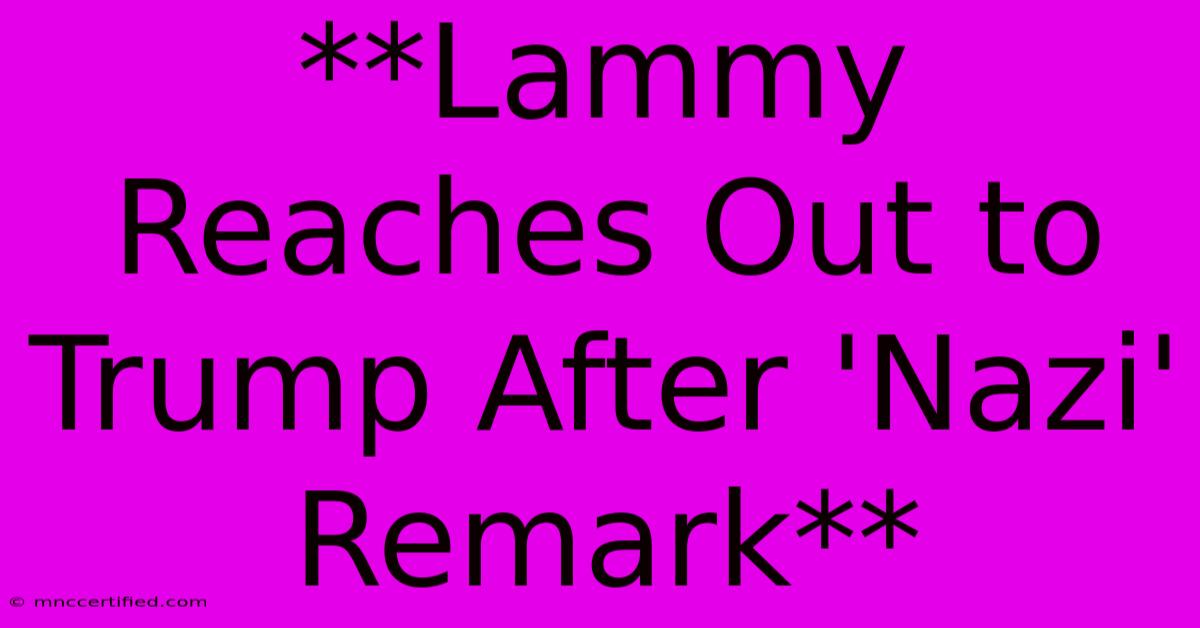**Lammy Reaches Out To Trump After 'Nazi' Remark**

Table of Contents
Lammy Reaches Out to Trump After 'Nazi' Remark: A Diplomatic Gesture or Political Calculation?
The recent exchange between British Labour MP David Lammy and US President Donald Trump has sparked significant debate, highlighting the complexities of international relations and the impact of public rhetoric. Lammy, known for his outspoken criticism of Trump's policies, had labelled the President's stance on Charlottesville "Nazi" in a fiery Twitter post. Trump, in turn, responded with a series of scathing tweets, accusing Lammy of being "a total loser" and suggesting he "take a pass" on commenting on US politics.
A Bridge of Diplomacy?
Despite the apparent animosity, Lammy has taken a surprising step by reaching out to Trump, inviting him to visit the UK and discuss issues of mutual concern. This gesture, while unexpected, has been met with a mix of reactions. Some view it as a strategic move to mend fences and foster dialogue between the two nations. Others, however, see it as a desperate attempt to regain political leverage and silence Trump's criticism.
"I believe it is important to engage with President Trump, despite our differences," Lammy stated in a press release, adding, "There are many issues where we can find common ground, such as fighting terrorism and promoting trade."
The "Nazi" Remark: A Calculated Risk or A Moment of Anger?
The use of the term "Nazi" by Lammy has been widely debated. Some argue that it was a necessary and accurate description of Trump's stance on white supremacy and racism, while others criticize its inflammatory nature and potential to escalate tensions.
"It's one thing to disagree with Trump's policies, but calling him a Nazi is reckless and irresponsible," said Conservative MP Michael Fabricant. "It only serves to deepen the divide between our two nations."
Lammy himself has defended his use of the word, arguing that it was "a fair reflection of Trump's actions and words." He has also expressed regret for the inflammatory language but maintains that his criticism of Trump's policies is justified.
Trump's Retaliation: A Sign of Weakness or a Political Strategy?
Trump's response to Lammy's criticism has been widely criticized for its personal attacks and inflammatory language. Some have argued that his tweets are a sign of weakness, revealing a lack of composure and an inability to engage in constructive dialogue. Others, however, see it as a calculated political strategy, designed to distract from the controversy surrounding the Charlottesville incident and to garner support from his base.
"Trump's response is classic Trump: deflect, attack, and distract," commented political commentator Dan Rather. "He knows he can't win this fight on policy, so he's trying to win it by playing the victim."
The Future of US-UK Relations
The Lammy-Trump exchange has raised questions about the future of US-UK relations. While both countries remain committed to their alliance, the recent events have highlighted the growing divide between their respective political leaders. It remains to be seen whether Lammy's outreach will lead to a constructive dialogue or further exacerbate tensions between the two nations.
This episode serves as a stark reminder of the delicate balance between diplomacy and political posturing in the age of social media. It remains to be seen how this high-profile exchange will ultimately impact the relationship between the US and the UK.
Keywords: Lammy, Trump, Nazi, Charlottesville, US-UK relations, diplomacy, politics, Twitter, international relations, political rhetoric.

Thank you for visiting our website wich cover about **Lammy Reaches Out To Trump After 'Nazi' Remark**. We hope the information provided has been useful to you. Feel free to contact us if you have any questions or need further assistance. See you next time and dont miss to bookmark.
Featured Posts
-
Is Cold Laser Therapy Covered By Insurance
Nov 07, 2024
-
Trump Victory Party Ivankas Presence
Nov 07, 2024
-
Club Brugge Edges Aston Villa 1 0
Nov 07, 2024
-
Bitcoin Hits Record High Following Trump Victory
Nov 07, 2024
-
Watch Bayern Vs Benfica Champions League Live
Nov 07, 2024